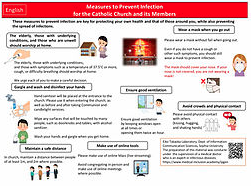Like a Child

Homily by Fr. Edgar Gacutan, CICM Feast of Santo Niño January 21, 2018 ~ St. Ignatius Church (Mark 10:13-16)
The Gospel according to Saint Mark, from which today's scene is taken, is the shortest of the four gospels. It starts with this sentence: "The beginning of the good news of Jesus Christ, the Son of God." Eight verses later, Jesus makes his appearance: "In those days Jesus came from Nazareth of Galilee and was baptized by John in the Jordan" (1:9). There is no child Jesus in the gospel of Mark.
The gospel of Matthew devotes a few verses about the baby Jesus: The newborn Jesus was visited by a group of wise men from the East. We are familiar with this story. It is read on the feast of the Epiphany.
The only scene where a "child Jesus" appears is in the gospel of Luke: Jesus was twelve years old, and as in previous years, he went with his parents to Jerusalem for the Passover festival. When it was time to go back home, Mary and Joseph did not know that Jesus was stayed behind in Jerusalem. After a day's walk they returned to Jerusalem to look for him. It took three days for them to find Jesus at the temple sitting among the teachers, listening to them and asking questions. Those who heard from the child Jesus were amazed at his understanding and his answers. We know this scene as the finding of Jesus in the temple, the fifth joyful mystery.
There is no narrative at all on how Jesus spent his teens in his hometown. The description of Luke about the growth of Jesus is very short: Jesus was obedient to his parents and he increased in wisdom and in years, and in human and divine favor.
We may imagine how Jesus spent his childhood years: He did errands for his parents. He played with kids of his neighborhood. He learned his father's trade. He kept on learning the word of God from teachers.
When Jesus became an adult he left house to devote his time fully to proclaiming the kingdom of God, the reign of God. Thus the former child Jesus became the fulfillment of God's promise that He would send a Wonder-Counselor, a Prince of Peace, as prophesied in the first reading (Isaiah 9:1-6).
Jesus fulfilled this prophecy without dressing the part, so to speak. He didn't go around wearing princely robes. He didn't go around telling everyone he was a prince. He was a servant. He mixed with people. In fact, he went to those who were despised by his society.
Jesus is prince, but one dressed ordinarily. He preached love and service. Of leaders he said that they like to make their authority or power felt.
Since time immemorial he has a constant parade or appearance of kings or leaders who want to show their power and might. They do this by showing their latest weapons or artillery or by defeating weaker kingdoms. We are afraid of these leaders. These leaders are sometimes called "boy-king" or "man-child", a grown man who is very immature. We also have petty kings everywhere. You may have met one or two of them: the one who likes to drop names or lets you know he has power.
Today we give homage to the child Jesus, the one who at twelve was interested in learning the Word of God from elders and priests, the one who was obedient to his parents and increased in wisdom and in years, and in human and divine favor.
We dress the child Jesus as a prince or a king, as sign of our homage. Remove those royal trappings and Jesus remains a Prince of Peace. Some like to dress up the child Jesus as a policemen or a fisherman. Yes, a fisherman, a policeman, a priest is invited to grow up like Jesus. All of us, whatever trade or profession we are engaged in - we are invited to learn from Jesus, to follow Him. You are asked to bring your children to Sunday school so they learn like Jesus and learn from Jesus.
Today Jesus tells us adults to become like a child. As children we are totally dependent upon our parents' generosity. Children do not stand up to their parents and say I deserve this or that. We do not stand up to God and say, "God, I'm good, be good to me too." Today we gather in this church to say just this: Lord, thank you for your grace. Thank you for leading me thus far. Lord, make me remain on the path showed by your Son, Jesus Christ. Or simply, "Lord, have mercy on me a sinner."
In Jesus' time lepers and other groups of people were condemned as sinners not worthy of forgiveness. Jesus refuted that teaching by associating with those people. There are people we want to avoid. Perhaps we go to the extent of thinking that there are people who deserve death and destruction. God's mercy extends to all: to the good and to the bad, to children and to adults. This is the good news preached by Jesus. We thank God for His mercy. May we be also as merciful.


 ENGLISH
ENGLISH  ESPAÑOL
ESPAÑOL 










